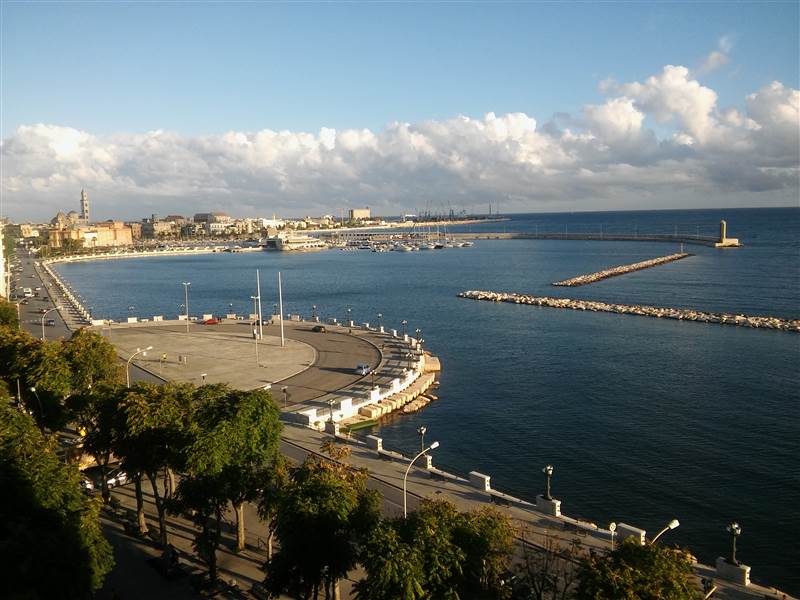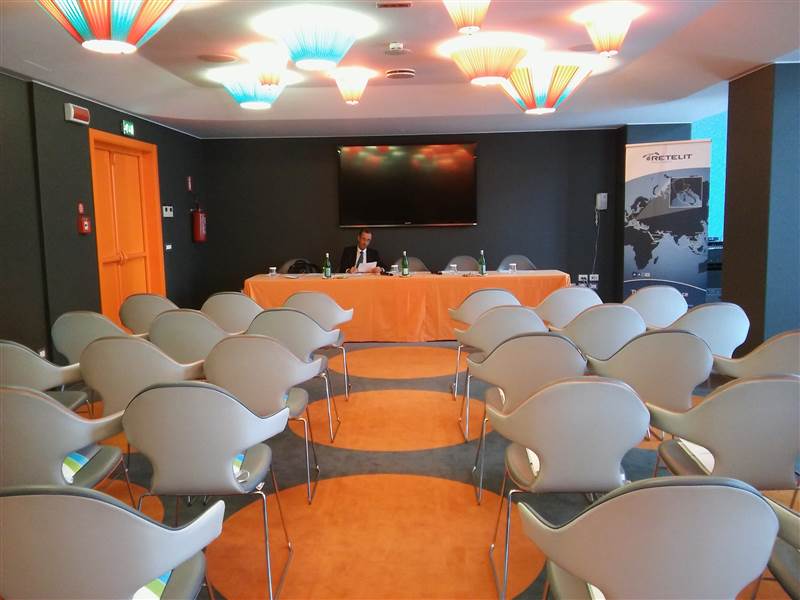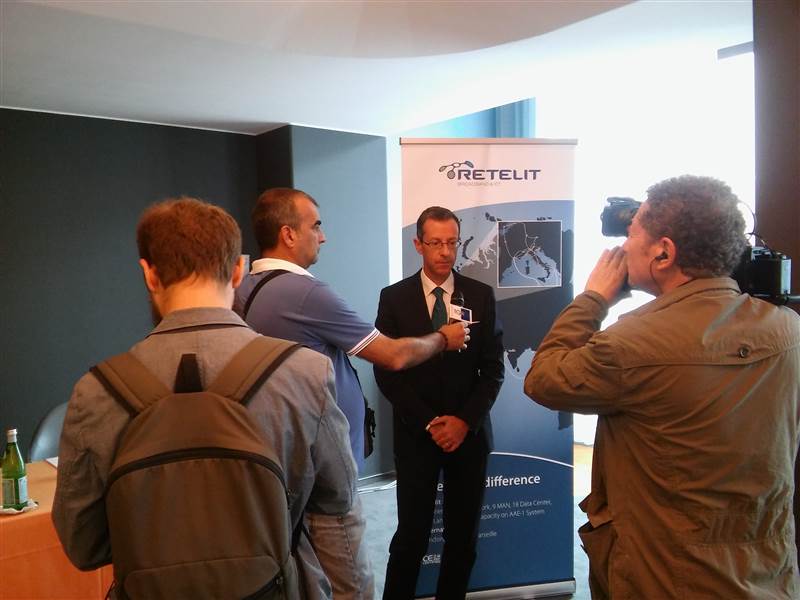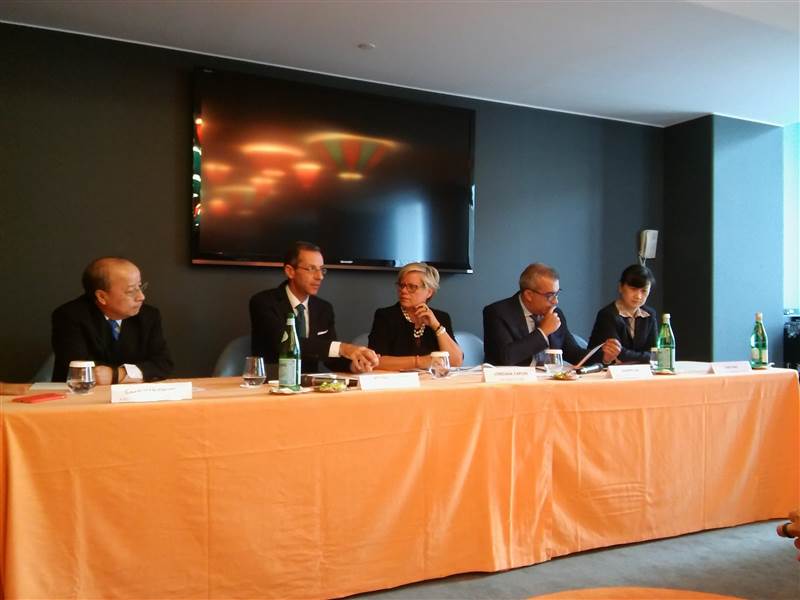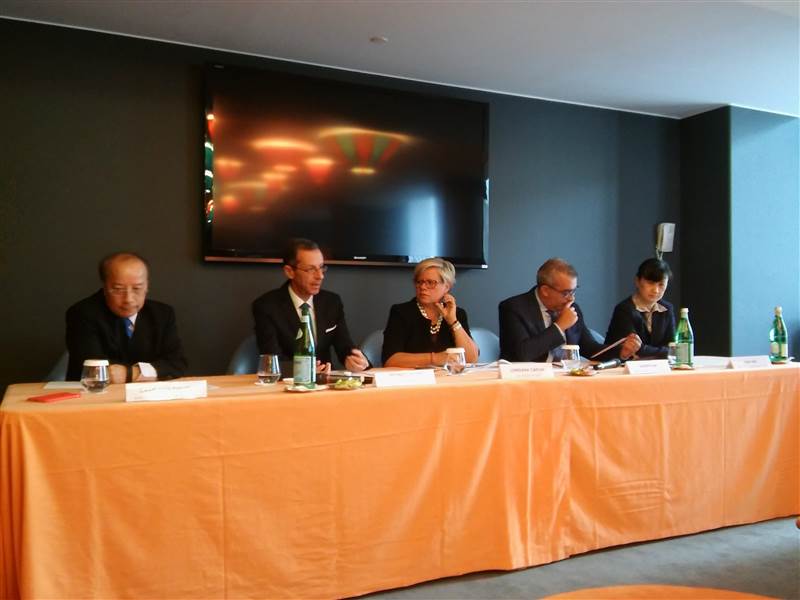22 September 2016
With Retelit, Bari is at the heart of the world
Today, in the presence of the highest offices of Apulia Region, the Italian telecommunications company presented the AAE-1 project, the submarine cable system that will provide the fastest data transmission between Asia, Africa and Europe
Press Releases
Today saw the end of the 11th meeting of the AAE-1 Consortium Management Committee in Bari. The AAE-1 consortium was established on January 27 2014 with an agreement, signed in Hong-Kong, to develop and manage a nextgeneration submarine cable connecting Europe to the Far East, via Africa, the Gulf countries and Southeast Asia.
On May 9 the cable was laid in Bari, one of three landing points in Europe alongside Chania (Greece) and Marseilles (France). It is connected to the landing station developed by Retelit, the sole Italian member of the Consortium. The cable ensures the connection of all major countries in Asia, Africa and Europe to the major telecommunications gateways, from Marseilles to Hong Kong and Singapore: 25,000 km of optical fiber will connect countries accounting for more than 40 percent of world population.
Bari has become the new landing point for the traffic on the Eurasian route thanks to its strategic geographic position at the center of the Mediterranean, the availability of Retelit’s advanced network infrastructure and the unique potential of the AAE-1 cable - currently the leader for speed and latency between Europe and the Far East and the sole with an express route from Egypt to Thailand without stop-over - providing an alternative to the traditional landing points already available in Italy.
Equipped with a 100 Gbps transmission technology, the submarine cable was in fact designed with a nominal capacity of 40 terabits per second, thanks to the cooperation among the leading international telecommunication operators. Besides Retelit, eighteen companies have joined the consortium to develop the longest and most complex submarine cable since SMW-3. Important operators such as: China Unicom, Djibouti Telecom, Etisalat, Global Transit, HyalRoute, Metfone, Mobily, Omantel, Ooredoo, Oteglobe, PCCW Global, PTCL, Reliance Jio, Tele Yemen, Telecom Egypt, TOT, Viettel, and VNPT.
“A global project for local development”: this project creates many opportunities in terms of awareness and business at the international level for Bari and the whole Apulia. As the nearest connection point to the leading neutral data centers and to Italian and European internet exchanges, this is today a strategic reference point not only at the national, but also at the international level, for the other 18 landing countries of AAE-1: France, Greece, Egypt, Djibouti Saudi Arabia, Yemen, Qatar, UAE, Oman, Pakistan, India, Myanmar, Thailand, Cambodia, Malaysia, Singapore, Vietnam and Hong Kong.
Laid in Bari with the support of local suppliers and companies, with no impact on the terrestrial or marine environment of the region, the next-generation cable AAE-1 responds to increasing demand for innovative communication formats, such as broadband internet, video, voice and data, being mainly generated by the constant growth of developing economies.
The cable system will be provisioned by the end of the year on schedule.
Federico Protto, Chief Executive Officer and General Manager of Retelit, said: “We believe that this important international investment will mark the beginning of a new chapter for Bari and Apulia: this region will be a strategic pole of great importance for the international traffic from submarine cables, not only for Italy but also for the development of the digital economy at the European and global level. We have today the opportunity to work as a system together with the operators running the other submarine cables landing in Italy. Southern Italy, with its fortunate geographic position, right at the hearth of the Mediterranean, can become the communication hub between Europe, the Mediterranean and the Far East, in alternative to Marseilles. It is a tremendous opportunity for the country and its digital development.”
“Given the growing demand, Retelit has already started selling international capacity on the AAE-1 cable in the run-up to the implementation of the submarine system. We will offer dedicated services to Italian companies for faster, highperformance connections between their offices around the world, services for telecommunications operators that want to extend or back up their international networks and provide the opportunity to offer low-latency and highly reliable connections to their own corporate clients. There are also dedicated services for content and over-the-top providers interested in running the large volumes of traffic related to their activities between Europe and the Middle and Far East”, added Giuseppe Sini, Head of Retelit International Business Unit.
“We want Apulia to be connected and fast, a smart region for citizens and enterprises,” the regional councillor in charge of economic development, Loredana Capone, said. “The policies of the Region, with the Ultrabroadband (Banda Ultra Larga, or Bul) and the Smart Puglia 2020 projects, pursue this objective. The laying of this highly innovative cable, with zero environmental impact, accelerates the pace of innovation in Apulia and turns our region into a digital bridge between East and West, not just a geographical one. I feel proud of the convergence of this private investment with the public investments that we have made, and are still making, to ensure widespread and fast connections to the entire region. The Ultrabroadband infrastructure in Apulia is the new highway on which data and services will move, promoting economic and social development. Last, but not least, I want to express the hope that all of us, in our different positions of responsibility in the public and the private sector, will continue to pursue innovation to connect to the world and plan new investments. These will find, in the infrastructure already developed, a very positive influence, since the entire technology context is strengthened. We will therefore organise a new meeting, right in our Region, with all 19 members of the AAE-1 Consortium and the international companies involved, and introduce them to our economic and research system, as well as to the suite of incentives provided with European funds.”
